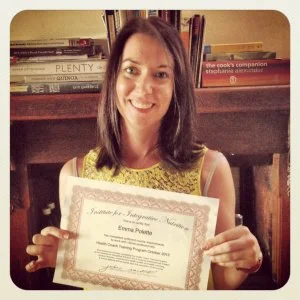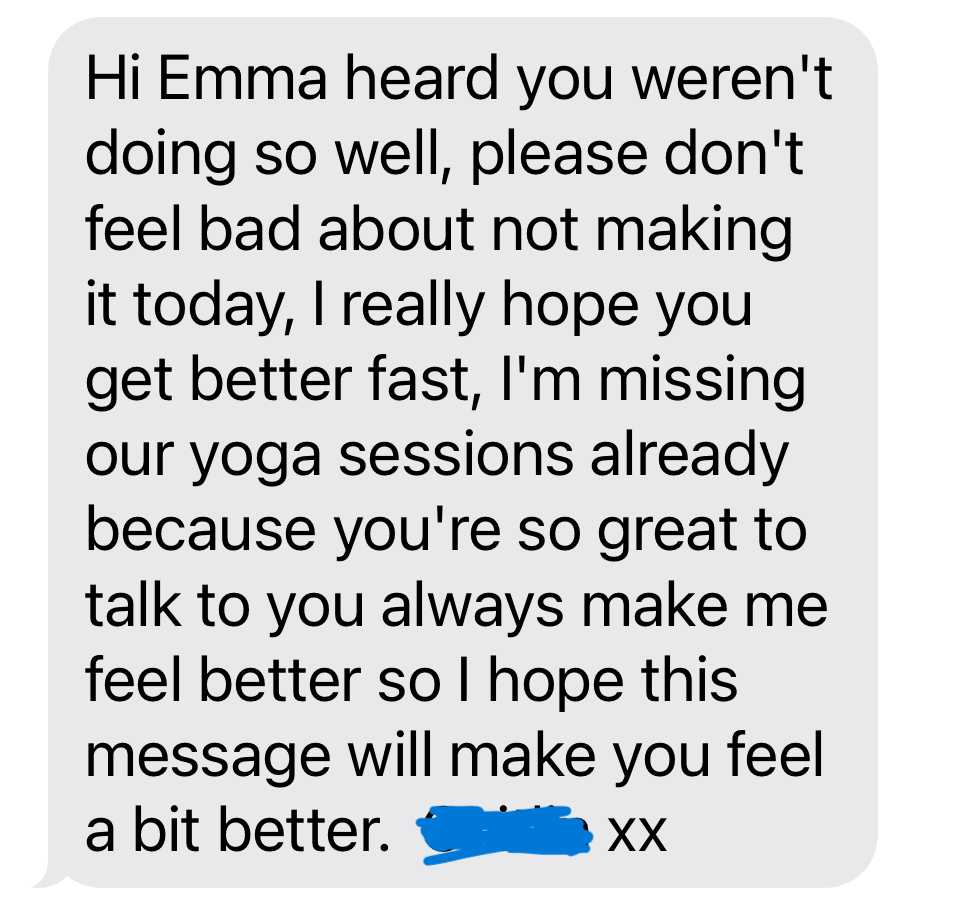10 lessons from 10 years in the health & fitness industry
Ten years ago this month I started studying for my health coaching certification and thus began my career in the the health & fitness industry. Since then I have also studied and received certificates in group fitness, personal training, yoga teaching, and Reiki and I am currently studying for a certificate in Intuitive Eating and a Diploma in Counselling (life long learner here 🙋♀️). I have learned so much along the way and as a health & fitness veteran I thought I could share what I believe are the most important lessons (and some of them won’t be what you think!)
This is me, half way through my health coaching studies in 2013 when I was allowed to start seeing clients.
It was also when I was in the throws of disordered eating and constantly thinking about food and being disappointed by the number on the scale on a daily basis.
There is no perfect way of eating that “works” for everyone (except there is)
When I studied for my health coaching course I spent a year learning about over 20 different types of eating from vegan to paleo, Ayurvedic and more. We were told right from the beginning that there is not one diet that works for every single body and I completely agree with that. But when I was studying health coaching I still believed there was a perfect diet for everyone (meaning that everyone could find a way of eating that will help them lose weight). I don’t believe that any more (see lesson #7). In terms of ways of eating that “work”, ANY way you eat “works”. Eating is about fueling and nourishing our bodies so we can get up in the morning and do all the things we want in our lives. If you’re still here, the way you eat works. Maybe some tweaking is in order… but it’s working.
2. Some exercise is better than none but rest is better than pushing through
Healthy behaviours are what gives us the opportunity to stay healthy (but nothing is guaranteed unfortunately - see #9) and regular exercise is one of the most important healthy behaviours. It can help to improve your mental health, reduce the risk of chronic diseases and yes, help to maintain your weight. But as your friendly personal trainer, I am much more likely to recommend gentle exercise. And if you are tired or sick or have a busy life for a hot minute, then I do recommend REST. Rest and sleep is soooooo healing. Don’t underestimate the power of rest.
3. Healthy behaviours are way more important than the weight
We are bombarded with messages that the only way to be healthy is to be thin. I think we’ve all known thin people with health issues and larger bodied people with issues. And I bet you’re thinking, “but fat people have MORE health issues.” What you might not know is that people who are “overweight” on the BMI scale are likely to live longer than those in the “normal” segment. Luckily we have a little known corner of the health & fitness world called Health at Every Size. This is a proven method of taking care of your health from a holistic perspective which doesn’t use weight as a health marker. The results show that people who use this approach are likely to improve health measures like blood lipids and blood pressure and are more likely to stick to a healthy eating and movement regimen as well as maintain good mental health. This is the approach I take in my Fit & Free membership and in my private coaching program.
4. Don’t stress about one “bad” meal (or even a week of them)
If you read the popular media you can be forgiven for thinking that eating one “bad” meal ruins everything. “Don’t eat sugar. Or carbs. Or meat. They are so bad for you!” But here’s the thing, it’s what you eat over a period of time that matters, not what you eat at one sitting. If you think about what you ate over the last 3 months… is most of it healthy? Probably. Then you’re fine. You are obviously getting the nutrients you need. The stress you feel about eating something “wrong” is much more unhealthy than the food itself. Trust your body. It knows what it needs. And if you feel like you can’t trust your body, then consider learning about intuitive eating. It gives you all the tools you need to make peace with food and never have to worry about the diet police ever again. You can learn more in my membership or by working privately with me.
5. Better boundaries = better health
You gotta learn to say “no” to the things you don’t want in your life and say “yes” to the things that you do want. It’s as simple and as hard as that. I realise that we all have so many expectations placed on us - from family, from work, from society… but you only live one life so why shouldn’t you be happy? When we create good boundaries we get to experience less stress and overwhelm, we create more time for ourselves so we can build those important healthy behaviours, we get better sleep, and we are just happier. A lot of what makes us unhealthy is STRESS. If we are constantly working on other people’s happiness then we are going to be stressed and that will not make you healthy. What could you say no to today?
But here is a HUGE caveat. It is a privilege to be able to create boundaries. This assumes you have a relative amount of financial privilege, that you aren’t in an abusive relationship, that you aren’t suffering from racism or weight stigma, or you don’t have a babe in arms. Be realistic about creating boundaries but don’t let your self-worth be the only thing that stops you from creating them (see point 8).
6. Don’t believe everything you read about health
The health industry is just that, an industry. Scientists who study this stuff are looking for funding (the next pay check) just like the rest of us. When they release studies out into the world they often send a press release to major news outlets. These press releases share the sexiest sound bites so that it is more likely the study will be featured in the media. This often leads to more funding for the next study. The worrying thing is that many journalists only read the sexy sound bites and so take things out of context. And then we (the public) hear something that is at best out of context and at worst, just completely wrong. This leads to confusing and often contradictory health advice which makes life stressful. My tip here is to avoid jumping on every health band wagon and keep your health & fitness regimen simple. I also recommend listening to Maintenance Phase, a podcast about debunking health & diet trends that should never have made it to the press. A level of scepticism when it comes to health journalism will save you a lot of time, money and stress.
7. Diets don’t work
Yes of course you can lose weight. Of course. We’ve probably all done it, or know someone who has. But you can’t keep it off. Not without creating some sort of eating disorder.
Let me break it down for you… Over 90% of people who try to lose weight through dieting will regain all of the the weight within 5 years (most up to two thirds of it in the first year), and over 60% of people will gain MORE weight than they lost. The people who keep off the weight will most likely have to continue to restrict their diets more and more aggressively to keep it off. This is because of biology.
We have a set point weight which is a range of plus or minus about 5 kilos that we can easily maintain without needing to diet. Much like we can’t change our shoe size or height, we can’t change this set point (unless we diet frequently and that will make the number go up!) Each time we lose weight our bodies freak out and slow down our metabolisms to try and protect this set point. A whole host of hormonal and psychological factors are at play.
It’s not a lack of willpower that makes you break your diet. It’s biology. Think about when you’ve been holding your breath underwater for a while (restricting breath), when you get back to the surface you’ll take a big gasp and a few more deep breaths to get back to your equilibrium. Same thing when you diet. When you restrict your food intake, your body will compensate by making you want to eat more to make up for what you didn’t eat. You can’t fight it. And if you’ve dieted a few times your body will panic and get you to put on more weight to protect you from what it perceives as starvation, which you perceive as just being healthy.
But here’s the big kicker… weight cycling (going up and down in weight which is what dieters do) results in increased inflammation (which is a precursor to lots of diseases), as well as hypertension, insulin resistance, dyslipidemia, plus poorer overall cardiac outcomes and increased mortality risk. Instead of a focus on weight loss, eat well, exercise regularly, manage stress, get good sleep and learn to respect the body you have now.
Get all the facts and stats here.
8. Focus on self-worth not six-packs
I was one of those people who truly believed that getting the perfect body would mean I’d be happy. I’d be more confident, more energetic, more attractive and I’d get the perfect job and the perfect partner and life would be perfect… But because I could never get the “perfect” body (see the point above), I was never happy. I wasn’t allowed to be happy until I achieved that goal and I was never going to achieve that goal.
Luckily, when I was recovering in hospital in 2017 after a total hysterectomy I received a divine message that said, “Emma, you’ve punished your body for long enough, now it’s time to love it instead.” It was either a divine message or the morphine. But it was just what I needed. I spent the next few years focusing on loving myself just as I am, rather than thinking I’d be worthy in the future once I had Jennifer Aniston’s body. Which was lucky because not only can I never have Jen’s body because she has it, I proceeded to gain about 15 kilos post menopause. Imagine what my self-worth would be like if I still thought I needed that body to be happy.
Now I have the perfect job(s), I am confident, I have stopped drinking alcohol, I rarely beat myself up with negative thoughts and I treat my body with respect. The amount of brain space I have freed up has been incredible. I’ve read 76 books so far this year and I couldn’t have done that if I still thought I wasn’t worthy at this size. I’d be too busy thinking about my next meal.
9. Your personal behviours are only one determinant of your health
If you follow any health influencer on Instagram you probably believe that its only YOUR behaviours that determine your health. But in fact there are several other things that factor into your health - your genetics, the environment in which you live, your social standing and access to medical care.
I’m not saying that you shouldn’t take care of yourself because there is no point - not at all. Please continue to eat intuitively, move your body regularly, manage your stress and get a good night’s sleep. However, if you have the genetics of someone who is destined to have a larger body, there is not much you can do about it (besides learning to respect yourself regardless of your size). If you live in a big city with lots of smog and a long commute that drives you to screaming at the car in front of you, then this will impact your health way more than having a Macca’s lunch every now and then. If you don’t earn a lot of money or need to work 2 or more jobs to survive, then you won’t have enough time to exercise regularly or prepare healthy meals from scratch. If you live in a remote or rural area you may not have access to as many specialist medical practitioners as you would like.
These things will all affect how healthy you are so don’t make it just about how many calories you eat of if you are getting enough kettlebell swings into your week. Being healthy is so much more nuanced than that and unfortunately isn’t possible for everyone.
I spent my 30’s and the first part of my 40’s making sure I was in the healthy weight range, exercising regularly, eating very clean, but I was still dealing with stage 4 endometriosis, and the commute that made me scream and the stress of trying to deal with it all. This lead me to relying on too many glasses of wine that then further impacted my health and so on and so forth. Focus on feeling good. That’s really all that matters.
10. Find someone to talk to
More than eating well and getting fit, I believe having a professional to talk to is imperative for a healthy lifestyle. So much of what makes us stressed are all the thoughts that spin around our heads. That’s why having some to talk to can make a huge difference. Especially when they have professional experience. I regularly see a counsellor who I started seeing to help with my sobriety but who is now my “general” counsellor. I also have a business coach who helps me with making decisions about my business but who I also now call a friend.
If you need support to create a healthy lifestyle, you might want to consider talking to me! Find out more about my 6-month program here.
Here’s a lovely message I recently received from a regular client.


